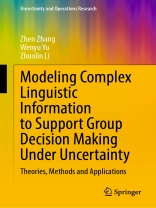This book systematically explores theories related to linguistic computational models and group decision making methods under uncertainty. It introduces innovative linguistic computational models capable of fusing complex linguistic information, including multi-granular linguistic information, unbalanced linguistic information and hesitant fuzzy linguistic information. Building upon the linguistic computational models, this book presents methods tailored to various types of group decision making problems under uncertainty. Additionally, it delves into group decision making problems where the personalized individual semantics of experts are considered. The book also showcases practical applications of the proposed group decision making methods, ranging from ERP system supplier selection to talent recruitment, subway line selection, and location selection for electric vehicle charging stations. By shedding light on novel models for modeling complex linguistic information and introducing new approaches to addressing linguistic group decision making challenges, this book offers valuable insights for engineers, researchers, and postgraduates interested in decision analysis, operations research, computational intelligence, management science and engineering, and related fields.
Inhaltsverzeichnis
Linguistic Computational Models for Computing with Words.- Basic Linguistic Computation Models for Computing with Words.- Linguistic Computational Models for Modeling Complex Linguistic Information.- MAGDM Methods Based on Multi-granular Linguistic Information.- Consensus-based Method for MAGDM with Multi-granular Unbalanced Linguistic Information.- MALGDM Method with Multi-granular Linguistic Information.- MAGDM Methods Based on Hesitant Fuzzy Linguistic Information.- MAGDM with Multi-granular HFLTSS: A Minimum Adjustment-Based Consensus Model.- Extended TODIM for MAGDM Based on Unbalanced HFLTSS.- A Linguistic Distribution-based Approach to MALGDM with Multi-granular Unbalanced Hesitant Fuzzy Linguistic Information.- PISs-Based Linguistic GDM Methods.- Consistency and Consensus Driven Method for GDM Based on PISs.- A PISs-Based Approach to SNGDM: Managing Non-Cooperative Behavior.
Über den Autor
Zhen Zhang received the B.S. degree in engineering management from the China University of Petroleum, Qingdao, China, in 2008, and the Ph.D. degree in management science and engineering from the Dalian University of Technology, Dalian, China, in 2014. He is currently a professor with the Institute of Systems Engineering, Dalian University of Technology. He has published more than 60 papers in refereed journals and conference proceedings, such as IEEE Transactions on Systems, Man, and Cybernetics: Systems, IEEE Transactions on Fuzzy Systems, IEEE Transactions on Computational Social Systems, Information Fusion, Knowledge-Based Systems, Annals of Operations Research, and Journal of the Operational Research Society. Prof. Zhang servers as an associate editor of Group Decision and Negotiation, Kybernetes, Journal of Intelligent & Fuzzy Systems, and Journal of Ambient Intelligence and Humanized Computing, and an editorial board member of Information Fusion, IEEE Transactions on Engineering Management, and International Journal of Computational Intelligence Systems. His current research interests include group decision-making, computing with words, preference learning, and multicriteria sorting.
Wenyu Yu received the master’s degree and the Ph.D. degree in management science and engineering from the Dalian University of Technology, Dalian, China, in 2013 and 2022, respectively. She is currently an Associate Professor with School of Data Science and Artificial Intelligence, Dongbei University of Finance and Economics. She has published more than 15 papers in referred journals and conference proceedings, such as IEEE Transactions on Fuzzy Systems, Journal of the Operational Research Society, and Annals of Operations Research. Her current research interests include group decision making and computing with words.
Zhuolin Li received the B.S. degree in engineering management from the Taiyuan University of Technology, Taiyuan, China, in 2019, and the master’s degree in management science and engineering from the Dalian University of Technology, Dalian, China, in 2022, where she is currently pursuing the Ph.D. degree. Her research work has been published in refereed journals, such as IEEE Transactions on Systems, Man, and Cybernetics: Systems, IEEE Transactions on Computational Social Systems, Information Fusion, Journal of the Operational Research Society, and Annals of Operations Research. Her current research interests include group decision-making, preference learning, and multicriteria sorting.












